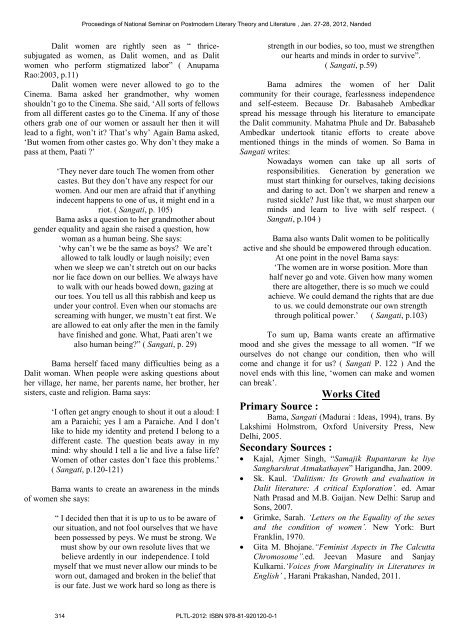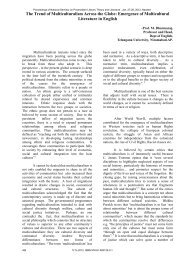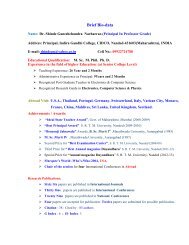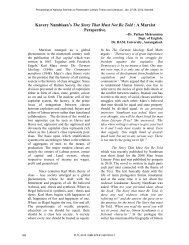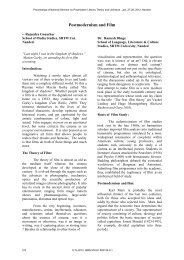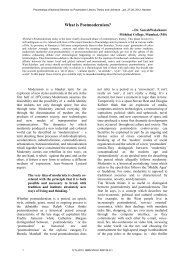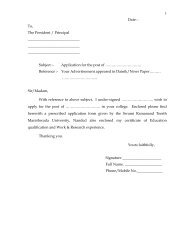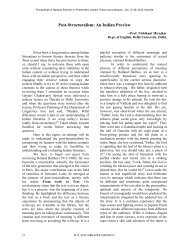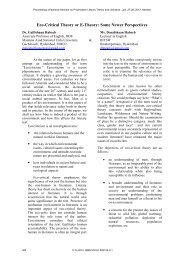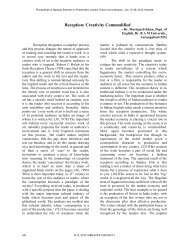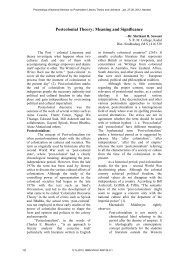Proceedings of National Seminar on Postmodern Literary <strong>Theory</strong> and Literature , Jan. 27-28, 2012, NandedThe Dalit feminist standpoint is about historicallylocating how all our identities are not equallypowerful, and about reviewing how in differenthistorical practices similarities between womenhave been ignored in an effort to underline casteclassidentities, or at other times differencesignored for ‘the feminist cause’ (Sangati: Introduction, p.xvii)Woman has been the victim of social injusticeand exploitation since the time immemorial. In Indiawomen is called Mata, Devi and Laxmi and apparentlyshe seems to be given due respect in society, but reallyshe was been reduced to an inferior status. In this land ofmale-chauvinist where social life is controlled by menand the customary laws are framed by men to suit hisselfish end, woman if often subjected to endless tortureby the pleasure seeking selfish husband. The conventionalsociety provides man many rights and freedoms but itdebars woman from them. Indian woman has the status ofa slave. Her duties are to work, to clean, to please herhusband’s libidinous desires and to submit herself to hermale chauvinism and physical violence. Burning womanto death and offering her for humiliation and prostitutionby the faithful and powerful husband has been thepractice of this spiritual land. Rama allowed Sita to beconsigned to fire and exiled her merely on the basis of thederogatory words used by a whimsical, ignorant andwicked dhobi. There seems no element of rationality inthe decision of Lord Rama. What to speak of an ordinaryman of this so-called spiritual land where the attitude ofthe Lord Himself to woman is like this. Similarly, inMahabharta, Draupati is put to dice by the so-calledDharmaraja. She is also humiliated in the presence of thegreat warriors, learned men and even her five mightyhusbands for whom she has been bearing the label ofpolyandry.Laxmi Holmstorm points out in the Introductionof her translated book that, women are presented inSangati by Bama as wage earners as much as men are,working as agricultural and building site laborers, butearning less than men do. Yet the money that men earn istheir own to spend as they please, whereas women bearthe financial burden of running the family, often singly.There are also constantly vulnerable to sexual harassmentand abuse in the world of work. Within the community,the power rests with men: caste-courts and churches aremale-led, and rules for sexual behavior are very differentfor men and women. Hard labor and economicprecariousness leads to a culture of violence and this is atheme that Bama explores boldly throughout the book.Dalit women can not bear the torment of uppercastemasters in the fields and at home they can’t bear theviolence of their husbands. In this connection Bamawrites:Even though they are male, because they areDalits, they have to be like dogs with their talesrolled up when they are in the fields, and dealingwith their strength in those circumstances. Sothey show it at home on their wives and children.Is it the fate of our Dalit women to be tormentedboth outside their houses and within ?( Sangati, p.65)The telling description of Dalit women at thebottom of social pyramids, as seen by Dr. B.R Ambedkaris crucial in understanding their position as the lowest oflow. Dr. Ambedkar saw the Hindu caste system as apyramid of earthen pots which are put on one another. Inthis structure not only the privileged castes of Brahminsand Ksatriyas are at the top and Shudras and untouchablesat the bottom but within each earthen pot ‘men are at thetop and women of that caste are on the bottom likecrushed and wasted powder. <strong>An</strong>d at the very bottom arethe Dalits and below them are the suppressed Dalitwomen’. ( Karan Sing Yadav:2009,p.103)Bama shows that how the Dalit women becomethe subject matter of misbehavior without their any fault.One of the characters Mariamma began to feel totally fedup with life. She says:For no fault of mine, I get abused wherever I go.Did I ever look that fellow in the face even? yetthe people of this village call me every kind ofname. Sangati, p.40)No doubt Bama’s grandmother becomes therepresentative of women’s movement. In the false case ofsexual misbehavior of Mariamma. Bama’s grandmothercomments:“when the fellow pulled you into the shed, whycouldn’t you have kicked him in the balls themand there?” ( Sangati, p. 28)Bama explained, how the upper-caste womendon’t show their pity or kindness to the Dalit-women ifonly as women to women, but they treat them withcontempt. They themselves lead lives shut up inside theirhouses, eating, gossiping and doing their husbands’bidding and them they treat Dalit women badly. Godknows how they stay shut up within four walls, alltwenty-four hours of the day. From this feministperspective, Bama explains:It seems that at least our women work hard andearn their own money, and have a few coins intheir hands. They don’t hold out their palms totheir husbands for every little expense, like thoseothers. All the same, because of our caste andbecause of our poverty, every fellow treats uswith contempt. If ever there is a problem or adisturbance, everyone starting with the police,chooses to blame and humiliate the women of ourcommunity. The government does not seemprepared to do anything to redress this. So wemust take up the challenge ourselves ( Sangati,p.66)313 PLTL-2012: ISBN 978-81-920120-0-1
Proceedings of National Seminar on Postmodern Literary <strong>Theory</strong> and Literature , Jan. 27-28, 2012, NandedDalit women are rightly seen as “ thricesubjugatedas women, as Dalit women, and as Dalitwomen who perform stigmatized labor” ( <strong>An</strong>upamaRao:2003, p.11)Dalit women were never allowed to go to theCinema. Bama asked her grandmother, why womenshouldn’t go to the Cinema. She said, ‘All sorts of fellowsfrom all different castes go to the Cinema. If any of thoseothers grab one of our women or assault her then it willlead to a fight, won’t it? That’s why’ Again Bama asked,‘But women from other castes go. Why don’t they make apass at them, Paati ?’‘They never dare touch The women from othercastes. But they don’t have any respect for ourwomen. <strong>An</strong>d our men are afraid that if anythingindecent happens to one of us, it might end in ariot. ( Sangati, p. 105)Bama asks a question to her grandmother aboutgender equality and again she raised a question, howwoman as a human being. She says:‘why can’t we be the same as boys? We are’tallowed to talk loudly or laugh noisily; evenwhen we sleep we can’t stretch out on our backsnor lie face down on our bellies. We always haveto walk with our heads bowed down, gazing atour toes. You tell us all this rabbish and keep usunder your control. Even when our stomachs arescreaming with hunger, we mustn’t eat first. Weare allowed to eat only after the men in the familyhave finished and gone. What, Paati aren’t wealso human being?” ( Sangati, p. 29)Bama herself faced many difficulties being as aDalit woman. When people were asking questions abouther village, her name, her parents name, her brother, hersisters, caste and religion. Bama says:‘I often get angry enough to shout it out a aloud: Iam a Paraichi; yes I am a Paraiche. <strong>An</strong>d I don’tlike to hide my identity and pretend I belong to adifferent caste. The question beats away in mymind: why should I tell a lie and live a false life?Women of other castes don’t face this problems.’( Sangati, p.120-121)Bama wants to create an awareness in the mindsof women she says:“ I decided then that it is up to us to be aware ofour situation, and not fool ourselves that we havebeen possessed by peys. We must be strong. Wemust show by our own resolute lives that webelieve ardently in our independence. I toldmyself that we must never allow our minds to beworn out, damaged and broken in the belief thatis our fate. Just we work hard so long as there isstrength in our bodies, so too, must we strengthenour hearts and minds in order to survive”.( Sangati, p.59)Bama admires the women of her Dalitcommunity for their courage, fearlessness independenceand self-esteem. Because Dr. Babasaheb Ambedkarspread his message through his literature to emancipatethe Dalit community. Mahatma Phule and Dr. BabasahebAmbedkar undertook titanic efforts to create abovementioned things in the minds of women. So Bama inSangati writes:Nowadays women can take up all sorts ofresponsibilities. Generation by generation wemust start thinking for ourselves, taking decisionsand daring to act. Don’t we sharpen and renew arusted sickle? Just like that, we must sharpen ourminds and learn to live with self respect. (Sangati, p.104 )Bama also wants Dalit women to be politicallyactive and she should be empowered through education.At one point in the novel Bama says:‘The women are in worse position. More thanhalf never go and vote. Given how many womenthere are altogether, there is so much we couldachieve. We could demand the rights that are dueto us. we could demonstrate our own strengththrough political power.’ ( Sangati, p.103)To sum up, Bama wants create an affirmativemood and she gives the message to all women. “If weourselves do not change our condition, then who willcome and change it for us? ( Sangati P. 122 ) <strong>An</strong>d thenovel ends with this line, ‘women can make and womencan break’.Works CitedPrimary Source :Bama, Sangati (Madurai : Ideas, 1994), trans. ByLakshimi Holmstrom, Oxford University Press, NewDelhi, 2005.Secondary Sources :• Kajal, Ajmer Singh, “Samajik Rupantaran ke liyeSangharshrat Atmakathayen” Harigandha, Jan. 2009.• Sk. Kaul. ‘Dalitism: Its Growth and evaluation inDalit literature: A critical Exploration’. ed. AmarNath Prasad and M.B. Gaijan. New Delhi: Sarup andSons, 2007.• Grimke, Sarah. ‘Letters on the Equality of the sexesand the condition of women’. New York: BurtFranklin, 1970.• Gita M. Bhojane.“<strong>Feminist</strong> Aspects in The CalcuttaChromosome”.ed. Jeevan Masure and SanjayKulkarni.‘Voices from Marginality in Literatures inEnglish’ , Harani Prakashan, Nanded, 2011.314 PLTL-2012: ISBN 978-81-920120-0-1


